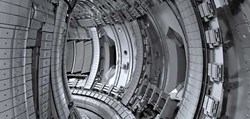
A computer-generated picture of the European tokamak JET equipped with an ITER-like wall. Source: EUROfusion
A European Doctoral initiative on Fusion Science and Engineering has been undertaken among the Universities of Padova, Lisbon and Munich aiming at combining two formal participation modalities in the same Doctoral programme course.
The increasing demand for energy—and consequential environmental, ethical and political issues—is driving a strong and growing expectation that fusion should be pursued as a sustainable energy source. With this doctoral course we aim at providing the European community with new young scientists, capable of handling the physics and engineering activities necessary to realize next experiments (ITER, JT-60SA) as well as later-stage demonstration reactor(s), DEMO(S) and, finally, commercial fusion reactors.
This European Doctoral initiative on Fusion Science and Engineering unites the universities of Padova (coordinator) and Naples Federico II in Italy; the Instituto Superior Tecnico (IST) in Lisbon, Portugal; the Ludwig Maximilians Universität (LMU) in Munich, Germany; and the Tampere University of Technology (TUT) in Finland. Fusion laboratories in the network, offering a wide range of specializations, will allow candidates to tailor their own educational path and research activity.
The course, which is taught in English, covers three main topics: the physics of controlled thermonuclear fusion; the engineering of a magnetically confined fusion reactor; and experimental tools for diagnosing and controlling in real-time fusion-relevant plasmas.
Click
here and
here for more information.


